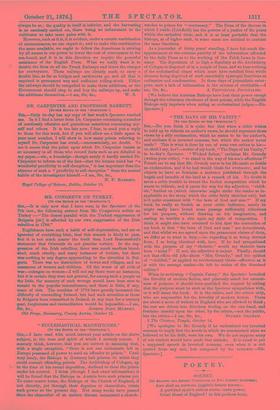"ECCLESIASTICAL MAGNIFICOES."
[TO THE EDITOR OF THE "SPECTATOR."] have read with much interest your article on the above subject, in the tone and spirit of which I entirely concur. I scarcely think, however, that you are correct in assuming that, -with a single exception, "there is not one ecclesiastic left in Europe possessed of power to send an offender to prison." Until very lately, the Bishops in Germany had prisons to which they could commit offending priests. The Archbishop of Cologne, up to the time of his recent deposition, declined to close the prison under his control. I think (though I lack exact information) it will be found that the Bishops in Austria have such prisons yet. To come nearer home, the Bishops of the Church of England, if not directly, yet through their deputies or chancellors, retain such power at the present day. Not many weeks have passed since the chancellor of an eastern diocese committed a church-
warden to prison for "contumacy." The Dean of the diocese in which I reside (Lichfield) has the powers of a justice of the peace within the cathedral close, and it is at least probable that the bishops, as of higher rank, in some cases are entitled to exercise the same functions.
As a journalist of thirty years' standing, I have felt much dis- appointment at the extreme paucity of the information afforded by the daily Press as to the working of the Falck Laws in Ger- many. The deposition of so high a dignitary as the Archbishop of Cologne is disposed of in a couple of lines, and we hear nothing of the ecclesiastical chaos which must have resulted from whole dioceses being deprived of such essentially episcopal functions as ordination and confirmation. In these days of journalistic enter- prise, such a lack of information is the reverse of creditable.—I [We believe the Austrian Bishops have lost their power except through the voluntary obedience of their priests, while the English Bishops only imprison when acting as ecclesiastical judges.—En. Spectator.]


































 Previous page
Previous page